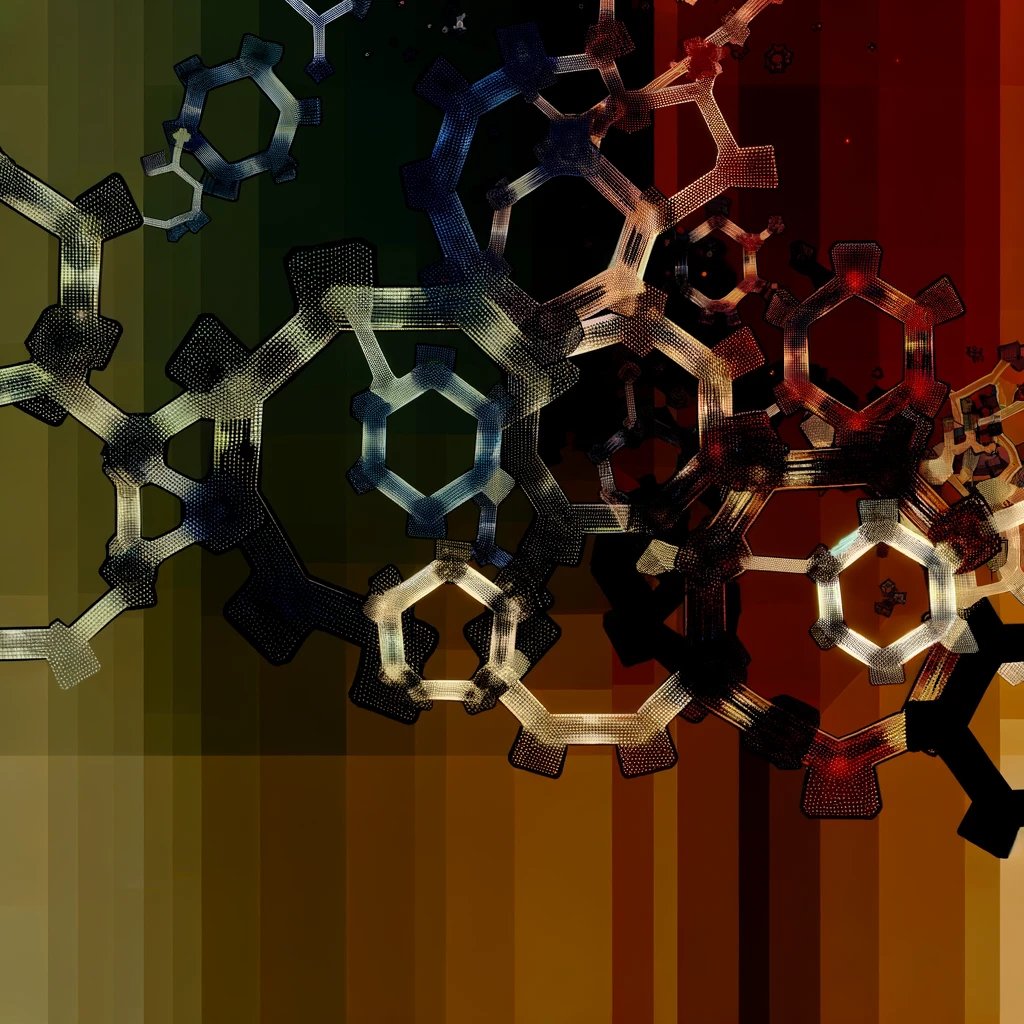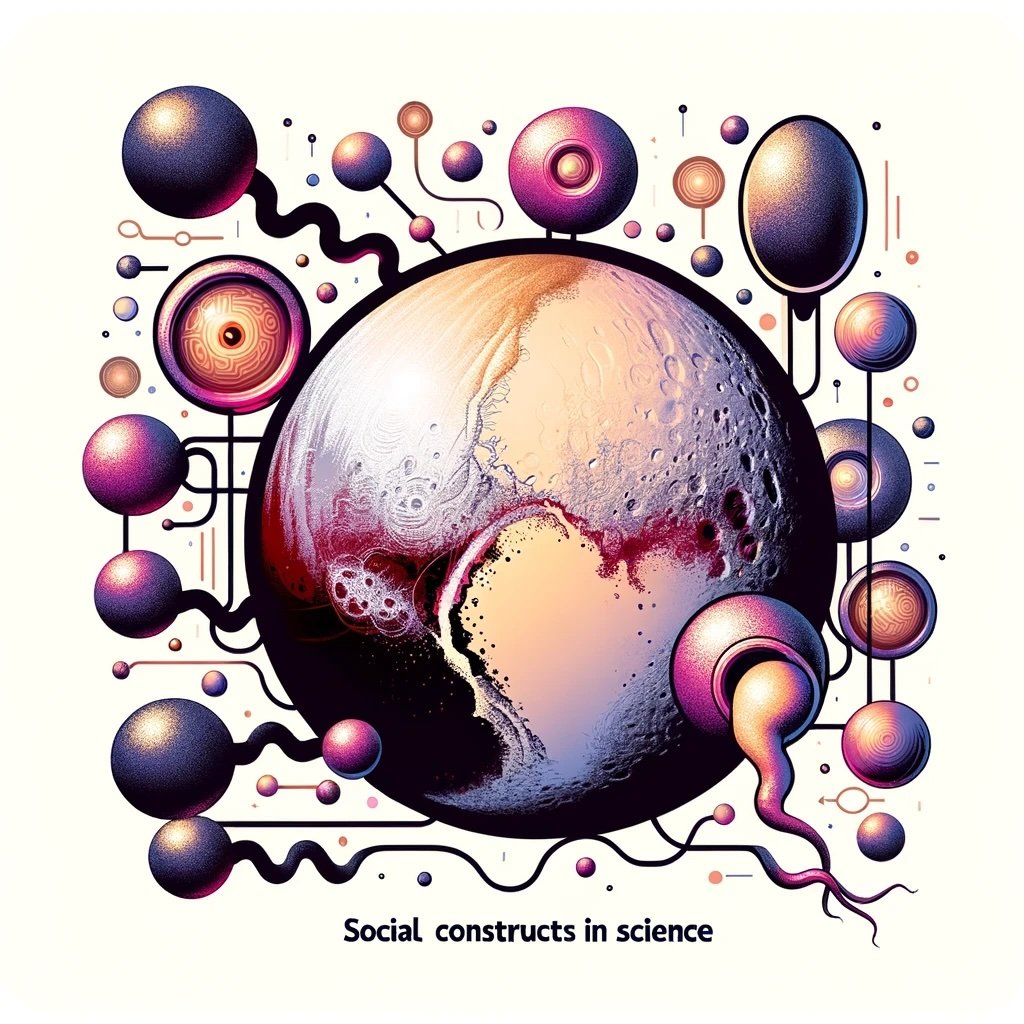Welcome to my blog!
Every morning, I begin with a cup of coffee and 15 minutes of free thinking. I write down everything that comes to mind, from new ideas to thoughts that emerged overnight. This is where I develop and refine my new research. You'll find some repetition and ideas still in progress. Some might seem unusual or unclear at first, but that's part of the journey! I'm excited to share how my ideas form and evolve.
Barbie's Wisdom: Reconciling Logic and Feelings
In this post, I examine Barbie's pearl of wisdom from her latest movie, revealing the enriching balance between logic and emotion.
We finally got to watch the Barbie movie this weekend. RIP stereotypical Barbie! There’s a lot to unpack from this movie. The moment that resonates most with "Logic in the Wild" is at the very beginning, when Barbie says: “This makes me emotional, and I'm expressing it. I have no difficulty holding both logic and feeling at the same time. And it does not diminish my powers. It expands them.” Yes, Barbie! This statement mirrors the concepts explored in "Logic in the Wild," challenging traditional perspectives on the relationship between logic and emotion.
Contrary to prevalent media portrayals and societal beliefs that position logic in opposition to feelings or emotions, I've never subscribed to the notion that these two are inherently in conflict. Take, for example, the character Spock from Star Trek. His portrayal embodies a kind of speciesist essentialism that starkly separates logic and emotions. It suggests a species inherently wired for logic, which I find overly simplistic and potentially misleading. It might be argued that for Vulcans, this dichotomy is more of a social construct than a biological imperative. However, this interpretation leads to the concern of a monolithic way of thinking enforced by societal structures, a concept I find equally troubling.
This binary thinking extends to the human experience as well. There's a common misperception that humans are innately emotional, setting us apart from machines and AI, with this emotional nature being constantly at odds with the rigors of logic. The oversimplified left brain/right brain theory, which categorizes one as logical and the other as emotional, and further aligns them with masculinity and femininity, is another manifestation of this flawed thinking.
Returning to Barbie's profound insight, she's absolutely correct. Embracing both logic and emotion simultaneously is not only possible, but it's also not a contradiction. Logic, in my understanding, isn't about truth per se; it's about coherence. Emotions, by their nature, are neither true nor false and thus cannot be deemed incoherent – not in the context of 'logic as the guardian of coherence', as I discuss in "Logic in the Wild."
Logic does not prioritize a simplistic interpretation of rationality over other decision-making methods or ethical lifestyles. It is completely viable to maintain rational thought while fully experiencing emotions. Credit to Barbie for expressing this so clearly! I aspire for "Logic in the Wild" to expand upon and defend this viewpoint, demonstrating how logic and emotion are not just compatible, but can synergistically amplify each other's effectiveness.
Dialetheism Alongside Validity as a Social Construct and Logical Nihilism
o conclude a provocative blog week, this post defends dialetheism, weaving together this unique philosophical perspective with the ideas of validity as a social construct and logical nihilism.
This week I argued that validity is a social construct and I defended logical nihilism. While I’m at it, I might as well tell you why I’m a dialetheist. To be a dialetheist is to believe in the existence of true contradictions. This might sound perplexing at first. Take, for instance, statements like "I am human and I am not human" or "It’s 23 degrees in Auckland and it isn’t 23 degrees in Auckland." These are clear contradictions, and it would indeed seem absurd to claim they are true. In fact, they are false. This initial sense of absurdity is precisely the challenge that dialetheism addresses.
Historically, in the European tradition, Aristotle is often recognized for formulating the law against contradictions. Rather than definitively defending this law, Aristotle articulated it in various ways, some of which are blatantly false. Despite these inaccuracies, his authority has consistently been used to deny the possibility of contradictions. This complex narrative, including Aristotle's contributions and their implications, is more deeply explored Logic in the Wild.
As I’ve discussed this week, Twentieth-century logic has been obsessively seeking the foundations of mathematics, which are supposed to provide logical underpinnings for all reasoning considered 'valid' (a notion I argue is a social construct). Therefore, asserting the existence of true contradictions in the 21st century directly challenges this long-established tradition, particularly within mathematical logic. To claim that the quest for mathematical foundations was merely a dream, disrupted by the reality of true contradictions, is naturally (and here I empathize with the reaction) perceived as an offense.
However, recognizing true contradictions does not mean we forsake all rationality. Accepting every contradiction would lead to triviality, where everything is considered true - a situation no logician accepts. Even we dialetheists, who acknowledge certain contradictions, staunchly reject this notion of triviality. Our focus lies on what I describe in "Logic in the Wild" as 'insolubles,' statements that, based on first principles, imply each other’s opposites. The Liar paradox is a classic example, asserting “I am a false sentence.” This paradox demonstrates a true contradiction through its self-referential nature: if it’s true, then what it says is true, namely that it’s false, so it’s false. But if it’s false, it’s false that it is false, so it is true (double negation, first principle). So it’s a true contradiction. Weird? Sure, but not trivial.
In the chapter “Logic in the Weird” of Logic in the Wild, you’ll discover how logic guards coherence in the face of the weird, the absurd, the paradoxical, and the insoluble. Writing this book has altered my perspective, especially regarding how logic functions within a community. It has led me to a broader viewpoint that accommodates the practices of twentieth-century mathematical logicians, who sought coherence in mathematics, while also allowing logic to uphold coherence in more perplexing contexts. Recognizing that logic isn't governed by universal laws (logical nihilism) frees it within the community, offering an alternative to full-blown emotional empathy. This, I believe, marks the beginning of logic’s rehabilitation.
Logic at the Rescue of Empathy: Navigating Societal Divides
This post examines the challenging demands of empathy in a polarized world and proposes logic as a vital tool to bridge understanding and foster empathy amidst diverse viewpoints.
The world is increasingly becoming divided, with each of us drifting further apart, quick to judge and categorize others. Social media has exacerbated this issue, creating echo chambers that resemble small fiefdoms of personal beliefs. Barack Obama once pointed out the crucial need for empathy in healing our fragmented world. In an interview, he highlighted the absence of empathy, noting that regardless of our differences, we all face similar challenges: raising and loving our families, earning a living, and maintaining our health. This idea transcends the divides in our polarized society. Even those who seem diametrically opposed to us share fundamental human needs like family, sleep, food, and employment.
The Obamas' latest film production echoes this theme, depicting an America torn apart by societal polarization. A pivotal scene features a survivalist and a person of color in a standoff, with a potentially violent outcome looming. However, an academic intervenes, urging the survivalist to recognize their shared humanity, their mutual need to protect and care for their families. This moment underlines the potential of empathy as a tool for mending societal rifts.
But is empathy alone the solution to our fragmented society? In theory, yes, but in practice, it may be too demanding. Empathy requires us to fully share in another's feelings, a challenging feat. For example, observing the new coalition forming the New Zealand government – comprising conservatives, neoliberals, and demagogues – I find it impossible to empathize with their perspectives. Their views on the country's direction evoke feelings of disgust in me, especially when considering Winston Peters's contempt for dissenting opinions. Sympathy, defined as feeling pity for someone else's misfortune, also doesn't apply here.
What remains, then, is logic. In Logic in the Wild, I argue that logic provides a neutral ground for dialectical inquiry. It enables us to engage with differing viewpoints and find common interests, decisions, or beliefs without the necessity of shared emotions. Logic allows us to appreciate Obama's insight: despite our ideological or cultural differences, we have more in common than we might realize. It requires us to suspend personal beliefs and strive for constructive communication. While Obama is right in advocating for more empathy, we don't necessarily need to transform everyone into empaths. Instead, recognizing the unifying power of logic can be a first step toward finding common ground amidst differences. Perhaps logical interaction within the community can even pave the way toward developing empathy. Let's give logic a chance!
Validity as a Social Construct: Insights from Logical Nihilism
Revisiting the concept of validity as a social construct, this post incorporates insights from Gillian Russell and logical nihilism, enhancing the understanding of logic as 'the guardian of coherence' in 'Logic in the Wild'.
In my previous blog post, I posited that validity might be considered a social construct, which naturally leads to an intriguing question: does this extend to fundamental logical principles like conjunction elimination? Conjunction elimination is a foundational logical rule stating that if a conjunction 'A & B' is true, then both A and B must be independently true. This raises an intriguing question: how can such an apparently unassailable rule be viewed as a social construct?
Gillian Russell, a prominent logician, proposes the concept of logical nihilism. This perspective is underscored by her argument that counter-examples can be identified for any logical principle. Consider the peculiar sentence: "I'm only true when part of a conjunction." When combined with another true statement, such as "My cat's name is Wilhelmina," we arrive at a true conjunction because both conjuncts are independently true. Yet, upon eliminating the conjunction, we are left with a standalone statement that is false. This contradiction is indeed puzzling.
In "Logic in the Wild," I explore various perplexing scenarios and the solutions proposed for them. Using the metaphor of the 'mailbox,' a makeshift air filter created during the Apollo 13 mission, I illustrate how insolubles continue to exist regardless of efforts to resolve them. Theoretical constructs like Tarski's "Tower of Truth" are developed to circumvent self-referential truth ascriptions. However, Tarski's Tower, akin to the mailbox, serves more as a temporary fix rather than a comprehensive resolution to the problem of insolubles.
Revisiting the concept of logical nihilism and Russell's unique counter-examples, we can imagine a range of 'mailboxes' designed to exclude such statements. Common objections might include "this isn't a legitimate statement" (but why shouldn't it be?) or "a statement shouldn't alter its truth value when combined with others" (but why not? The example I provided does exactly this). However, these objections falter upon closer examination, as demonstrated by the example discussed previously. It's crucial to note that such solutions are akin to mailboxes unless they possess independent motivation and aren't merely ad hoc or arbitrary constructs devised to sidestep a problematic scenario we find disagreeable.
Russell's advocacy for logical nihilism posits that there are no universally applicable logical principles. This does not render logic futile. On the contrary, it's a sobering acknowledgment that logic transcends mere mathematical formalism. The failure of 20th-century attempts to completely formalize logic lies not in an incomplete understanding of the mathematics but in the inherent limitations of such an endeavor. The misconception that validity is solely what 20th-century mathematicians constructed (akin to a mailbox) is where I see validity as a social construct.
My proposal in "Logic in the Wild" is to view logic as the 'guardian of coherence.' This approach reconciles logical nihilism by not asserting the existence of universal logical principles, while still valuing 20th-century logic as a significant means of maintaining coherence through mathematical consistency. So, there is no cause for alarm; we are better positioned to appreciate and utilize logic now more than ever.
Is validity a social construct?
I provocatively explore the contentious notion that validity might be a social construct, challenging traditional perspectives.
Is validity a social construct? This question might seem preposterous or even absurd to some, but I feel like being a bit provocative this morning. In this post, I aim to examine whether the standards of logical coherence we adhere to might actually be shaped by social constructs.
Let's start with some context. The logic we refer to as "classical" in the twentieth century is somewhat of a misnomer. It's hardly the logic of the ancients. For instance, Aristotle, while not having a conditional, believed in existential import—that is, the idea that any true generalisation must have at least one true instance. The Stoics had a concept akin to the material conditional, but their logical arsenal was limited beyond that.
During the medieval period, logicians devised numerous unique and intriguing logics in an attempt to blend pagan philosophy with Christianity. The Enlightenment era primarily involved the revival of old texts and fragments. However, the logic of the twentieth century is distinct from these historical precedents. It was when mathematicians took the helm that a significant shift occurred, marked by a newfound obsession with consistency. That consistency was deemed the measure of logical coherence is not my point of contention here.
My query is whether validity, as we understand it, is a discovery by mathematicians, formalised to underpin consistency in mathematics, or if it's a construct developed by a specific group, in a particular context, with defined goals, to encapsulate and manage this concept of consistency.
From the outset, some mathematicians and philosophers have challenged conventional standards of validity. Consider the principle of the excluded middle. Is it inherently valid? Brouwer, along with constructive mathematicians and intuitionist logicians, crafted an alternate framework for validity that also aspires to uphold consistency. Similarly, the principle of explosion, which posits that anything follows from a contradiction, has been questioned. Relevant logicians and paraconsistent logicians have devised mathematical systems that break free from the traditional fixation on consistency.
Why this deviation? Perhaps it's because the preoccupation with consistency itself is a social construct. Returning to Aristotle, we find not a reasoned argument for non-contradiction, but rather a dogmatic declaration. His European successors echoed this sentiment, transforming a tenet into a belief, and eventually, a belief into dogma. It is this dogma that I propose is the root of the social construct of validity.
There you have it—a thought to ponder. Put it in your pipe and smoke it.
Challenging Logic's Formal/Informal Divide
Logic in the Wild argues against the conventional formal/informal logic divide, showcasing logic as a multifaceted guardian of coherence across various domains.
Is 'Logic in the Wild' primarily about informal logic rather than logic itself? The answer is a definitive no – it's unequivocally about logic. In this book, I advocate the notion that logic is the guardian of coherence. I examine the ways in which logic maintains coherence in beliefs, arguments, and theories. This is crucial for exploring ideas and reconciling differing viewpoints by finding their common ground.
There are numerous standards that are utilised to maintain coherence. In legal contexts, these standards are shaped by the principle of reasonable doubt. In mathematics, a standard of consistency is paramount for the sake of generality, especially when seeking to establish foundations. Analytic philosophy, heavily influenced by mathematical methods, upholds standards that centre around validity. Theological discourse, meanwhile, accommodates doxastic ventures (or leaps of faith), allowing a greater margin for errir. In everyday life, the criteria for coherence vary significantly depending on the context, the stakes involved, or the urgency of finding practical solutions. This variety in standards underlines the universal role of logic in all these domains: to guard coherence.
As we look back to the turn of the 20th century, we observe that mathematicians began to dominate the field of logic, adapting it to meet their needs. This led to the establishment of a formal calculus that has since assumed a predominant role in the discipline. Consequently, logic has evolved into a tool primarily for ensuring consistency, adhering to standards of what I might term 'orthodox validity'. The challenge to this 'orthodox validity' and its expansion within non-classical logic is a compelling subject, which I plan to address in a future post.
My background in logic, though primarily philosophical, has been significantly shaped by mathematical training. This influence led me to view mathematical logic as the ideal, the gold standard of reasoning. In this context, mathematical logic, highly effective in its own applications, was considered a benchmark for other disciplines, although only in an approximate manner. From this viewpoint, informal logic is defined as anything not conforming to the formalism, symbolic manipulation, and mathematical dominance. I would suggest, more from anecdotal observations than empirical evidence, that formal logicians regard themselves as practitioners of 'real' logic. In contrast, those focusing on areas such as practical communication patterns or critical thinking are perceived as engaging in what might be termed 'in-formal' logic.
In 'Logic in the Wild', I argue that logic encompasses much more than the mathematical reasoning that was prevalent in the 20th century. Fundamentally, logic is the custodian of coherence. The method employed by 20th-century mathematicians, which involved guiding coherence in their domain through a focus on consistency, is merely one way to apply logic. This specific approach should not define the entire spectrum of logic, nor should it be the sole basis for distinguishing other coherence-maintaining methods as 'in-formal'. Consequently, 'Logic in the Wild' is not just a treatise on informal logic; it's about logic!
Logical Integrity in Politics
Exploring the crucial role of logical integrity in political decision-making, this post examines the varied application of logic in politics through the case of New Zealand Prime Minister Christopher Luxon's early actions and statements, emphasizing the need for consistent logical reasoning in governance.
As a philosopher and a logician, part of my role is to teach students the vital skill of applying logical reasoning effectively across various scenarios. This practice is not just an academic exercise; it plays a crucial role in real-world decision-making and problem-solving. In my experience, a common learning curve for students is moving beyond applying logic in isolated instances to embracing a more comprehensive application in a range of contexts
In the realm of politics, the application of logical reasoning is always under scrutiny, a reality that becomes particularly evident in the early tenure of political leaders. In the first week of Prime Minister Christopher Luxon's role, his handling of the controversial decision to repeal the smokefree legislation provides a case in point. These initial public statements reveal a tendency for an arbitrary application of logic in policy-making and governance. While offering a glimpse into his approach to leadership, they also subtly highlight the challenges and potential pitfalls in maintaining logical integrity across different contexts. Such instances underscore the importance of this fundamental aspect of decision-making, especially critical in the complex scenarios faced by political leaders.
The Principle of Logical Integrity
"Logical Integrity Across Contexts" demands a uniform logical approach in various scenarios. It is a call for recognizing and applying similar logical patterns in structurally similar scenarios, regardless of their content differences. In the realm of politics, where decisions have significant societal impacts, this principle is particularly crucial.
Luxon's Dismissal and Embrace of Logic
On the 27th of November 2023, in his appearance on the AM show, Luxon discussed the government's smokefree legislation with Ryan Bridge. The dialogue unfolded as follows:
Luxon: "When you've actually limited distribution and you're the only place selling smokes in some towns in New Zealand, you become a massive target for crime and for ram raids, and there will be an expanded black market that will be largely untaxed."
Bridge: "Couldn't you make the same argument for cannabis? I mean, you're talking about not wanting to have a black market, wanting to be able to tax the externality. Why don't you do a similar thing with cannabis?"
Luxon: "Yeah, different story, different effects, but I mean the reality here is we've got a tool in vapes which has actually helped a lot of people coming off smokes, which has been good."
In this exchange, host Ryan Bridge raised a logical point, indicating that the reasoning Luxon applied to tobacco should logically extend to cannabis. However, Luxon diverted from engaging with this logical similarity, choosing instead to highlight the distinct contexts surrounding tobacco and cannabis. This approach led him to sidestep the logical substance of the argument, focusing on the specificities of each situation rather than the underlying logical reasoning, and thus not directly addressing Bridge's query.
On the 3rd of December 2023, during a press conference, Luxon addressed an earlier factual mistake regarding the number of stores allowed to sell cigarettes in Northland. Recognizing this error, Luxon pivoted to a logical argument to support his stance. He stated: “[It] doesn't change a thing. The bigger point still holds that actually the reason why we opposed the legislation at the time is - and remember it hasn't taken effect, it's come into law but it hasn't taken effect - was simply to say we think that's the wrong way to go about it.”
The following day, on the 4th of December 2023, Luxon appeared on the AM show again and reiterated his logical standpoint: "The major reason is that limiting distribution creates a black market and ultimately will create more crime." This statement underscored his belief that regardless of the exact number of stores, the limited distribution would inevitably lead to a black market and an increase in crime. This week, Luxon has shifted from dismissing logic to embracing it in order to rectify his factual mistake.
Importance of Logical Reasoning in Politics
The contrast in Luxon's approach to logical reasoning in these two scenarios, as evident in his statements on the 27th of November and the 4th of December 2023, emphasizes how the application of logic varies depending on the context and the narrative at hand. While different situations may lead to different courses of action, it is essential for leaders to exhibit a certain level of consistency in addressing issues that can be tackled using a similar logical framework. During his initial week in power, Luxon vacillated between invoking logical reasoning and disregarding it in arguments based on context, resulting in responses that appear arbitrary. Luxon's diverse approaches to logical reasoning in policy-making hint at the intricate interplay between logic, narrative, and decision-making. This not only influences the efficacy of policies but also has implications for public trust in political leadership.
Conclusion
The principle of "Logical Integrity Across Contexts" is vital for coherent political decision-making. As leaders like Luxon navigate the complexities of policy and governance, adhering to this principle becomes imperative. It is not only the narrative that matters in politics but also a firm commitment to logical reasoning that adapts to various scenarios.
A New Conceptual Hypothesis: Meta-Coherence as Logical Integrity
This blog post explores the shift from the simplistic 'same logic, same response' slogan to a more nuanced understanding of meta-coherence through the concept of logical integrity.
In my attempt to characterise the meta-coherence principle, the initial 'same logic, same response' slogan fell flat. I want to try another angle today, talking about logical integrity. Let's start with what I mean by meta-coherence. Frankly, and this is the purpose of these morning free writing sessions, I’m in the process of discovering what I want to say and how. These morning free writing sessions serve as a journey of discovery for me, both in articulating my thoughts and in shaping them.
Meta-coherence, taken literally, is coherence about coherence. Imagine a primary level of logical coherence - the coherence in beliefs, arguments, and theories. This is the focus of my book, "Logic in the Wild," where logic acts as the guardian of coherence. Moving up a notch, to meta-coherence, logic continues its role as a guardian, this time overseeing its own methods in maintaining coherence at the foundational level. This kind of meta-level oversight is familiar territory for logicians, often referred to as the meta-theory.
In the twentieth century, mathematicians (and philosophers) played a pivotal role as guardians of meta-coherence. The meta-theory that logicians employ ensures that logic's role in preserving argumentative coherence is itself upheld by mathematical practices. By anchoring logical theory in a mathematical framework, we provide it with robust foundations, similar to what is done in physics and other sciences, and attempted in economics and social sciences.
However, the pursuit of meta-coherence can lead to weird, paradoxical, and complex scenarios, reminiscent of the epic return of the Apollo 13 shuttle to Earth. Just like the 'mailbox' contraption, a hastily assembled air filtering system that saved the astronauts' lives, these scenarios are fraught with unexpected challenges. The astronauts survived, but the shuttle was never destined to return to space. This story, as narrated in 'Logic in the Wild,' serves as a powerful metaphor for the challenges of transcending coherence to safeguard meta-coherence. It's akin to taking a plane, designed for atmospheric flight, and propelling it to the Moon. The complexity multiplies.
Does meta-coherence inherently demand such complexity? Perhaps that's why I'm tempted towards a simplistic slogan that could gloss over problems and offer practical guidance. But maybe the theoretical climb to meta-coherence isn't the only path. What if we focus on the embodiment of these concepts instead? This could mean exploring how meta-coherence is experienced and applied in real-world contexts, rather than solely in theoretical abstraction.
This leads me to my next conceptual hypothesis: exploring how meta-coherence might be understood as a form of integrity. Specifically, as a disposition to recognise and apply logic uniformly across different contexts. I'm worried about this approach, however, as it risks attributing flaws in logic to personal character. We'll cross that bridge when we get there.
The Final Reckoning of 'Same Logic, Same Response': Paving the Way for Meta-Coherence
This blog post marks the end of the "same logic, same response" slogan, transitioning towards the nuanced concept of "meta-coherence" in varied decision-making contexts.
The slogan “same logic, same response” did not resonate as I had hoped. Let's revisit the idea. I've been contemplating the concept of “meta-coherence.” While coherence pertains to the logical structures of arguments, beliefs, or theories, meta-coherence transcends this, operating on a higher level. To illustrate, consider two arguments that share logical structures but differ in content. Take, for example, Luxon's argument for repealing the smokefree legislation and its logical applicability to cannabis. Luxon's main point was that restricting distribution boosts crime and creates a black market. This is undoubtedly true for cannabis, where distribution restrictions are absolute, leading to a solely black market presence. Governments, naturally, aim to avoid crime and black markets, especially in drug distribution. The logic underpinning these arguments is identical, though their subjects differ.
Requesting Luxon to exhibit “meta-coherence” is essentially asking him to acknowledge this shared logic. However, this doesn't mean the government's approach to cannabis should mirror its stance on cigarette distribution. This is the point where the “same logic, same response” slogan falters. By “same response,” I didn't imply identical actions but rather a uniform attitude toward the logic of the argument, a testament to “meta-coherence.” In non-deductive decision-making contexts, external factors beyond the premises' scope influence the final decision. Cigarettes have a big health toll on society, are addictive, cause cancer, cost a lot of money, and are ultimately something bad for society (right?). Cannabis, as a recreational drug, has effects on society and individuals that are much less than those of other legal drugs such as alcohol, and indeed cigarettes (right?).
Luxon's stance on cannabis seems to favor the status quo, overlooking the stronger argument for legalizing recreational cannabis, which his logic inadvertently supports. This inconsistency ignores that the context might actually favor legal cannabis distribution while maintaining smokefree legislation. My initial “same response” advocacy has evolved into a deeper understanding. I champion a uniform recognition of logical coherence across various contexts. Logic is a critical component in decision-making but doesn't dictate the best course of action. It ensures coherence before considering external factors and context-specific details. "Meta-coherence," as I term it, entails evaluating argument coherence consistently – the 'meta' aspect. While “meta-coherence” might sound contrived, it captures my intention better than “same logic, same response”... To be continued.
Reevaluating the Slogan: The Pitfalls of 'Same Logic, Same Response’
I examine the 'same logic, same response' slogan, focusing on its limitations.
It’s time we reconsider the slogan “same logic, same response”. Currently, it struggles to effectively communicate what I aim to express. When taken literally, albeit with necessary qualifications, the slogan is misleading. I fear an overreliance on numerous caveats might lead to ad hoc justifications, which is not ideal. Let's delve into this.
The statement is inaccurate when interpreted literally, as logic alone doesn’t encapsulate the entirety of an argument's quality. An argument can be logical yet still flawed due to its false premises. Consider a frivolous example: "All logicians are unicorns. Patrick is a logician. Therefore, Patrick is a unicorn." This represents a valid argument, hence logically impeccable, but it's fundamentally flawed because the premise is untrue – no logician is a unicorn. Another argument with identical logical structure might be sound if its premises are true. For instance, “All humans are mortal. Patrick is a human. Therefore, Patrick is mortal.” Although these two arguments share the same logical framework, I don’t anticipate an identical response to both. I hope to have not convinced you of my mythical status, but I can assure you, I am indeed mortal.
So, the first caveat: by "the same response", I refer to an identical logical evaluation. This means assessing whether the premises logically support the conclusion. Both cited examples are valid, and thus, from a logician’s perspective, they are equally logical. This pertains specifically to deductive reasoning, where the standards are centered around validity.
In non-deductive scenarios, additional caveats are required, as context influences logical support. Non-deductive contexts are marked by more flexible logical standards, focusing on argument strength rather than validity. The premises here do not fully guarantee the conclusion, allowing a margin for error, which varies according to the context. Take this example: "90% of Aucklanders are zombies. Patrick is an Aucklander. Therefore, Patrick is a zombie." What are the odds of Patrick being a zombie based solely on the given premises? 90%, seemingly. It’s a probable hypothesis, though not certain. However, if new information emerges – say, no zombies have yet reached Waiheke Island, and Patrick resides there – the likelihood of Patrick being a zombie drops significantly.
This leads to the need for another caveat in non-deductive contexts. My colleague proposed incorporating a 'ceteris paribus' clause, modifying the slogan to “same logic, same response, all else being equal.” What exactly needs to remain constant? As I’ve elaborated in "Logic in the Wild", this is a complex issue, which I invite you to explore further in the book for a comprehensive understanding of 'ceteris paribus logic'.
For the purposes of this post, we can simplify it to mean that the information surrounding the premises should remain equal. If the only information available is that within the premises, with no external data, we attain a greater degree of logical stability across various contexts, including in non-deductive reasoning.
An application of this principle can be seen in political discourse. For instance, when critiquing the Prime Minister's lack of what I term 'meta-coherence' (a concept for another post) in handling cigarettes and cannabis policies, this principle comes into play. If the rationale for not reducing cigarette sale outlets is to avoid a black market, a similar logical approach should apply to cannabis, ceteris paribus. However, as expected, counterarguments often highlight dissimilarities in context, as exemplified by Luxon's “different story, different effects” response.
Hence, the second caveat: the context of evaluation must remain equal. Of course, one might argue, as Luxon did, that the contexts are not equal. This illustrates the need for further caveats, potentially leading to an unwieldy number of ad hoc qualifications for the "same logic, same response" slogan.
I'll leave the discussion here for now, intending to revisit and potentially reformulate this slogan in a future post. There’s much more to unpack, but for now, I must attend to other matters.
Seeking logical coherence in political discourse
Prime Minister Christopher Luxon’s approach to New Zealand's smokefree legislation and cannabis policies reveals a fluctuating application of logic, highlighting challenges in maintaining logical coherence in political discourse.
Prime Minister Christopher Luxon of New Zealand recently faced challenges regarding his party’s decision to repeal the smokefree legislation. This controversy stemmed from his claim that limiting cigarette sales to a single store in Northland would escalate crime and foster a black market. However, journalists highlighted inaccuracies in Luxon's assertion, noting that there would actually be 18 stores, not just one.
In response, during a press conference, Luxon attempted to clarify, suggesting he misspoke. He argued that the proposed policy would only allow a few stores to sell cigarettes across large regions, which would attract crime to these outlets and promote a black market. Luxon transformed his response into a logical point, stating: “[It] doesn't change a thing. The bigger point still holds that actually the reason why we opposed the legislation at the time is - and remember it hasn't taken effect, it's come into law but it hasn't taken effect - was simply to say we think that's the wrong way to go about it. […] Limiting distribution in that way, concentrating it in a few retail outlets, makes those stores a real magnet for crime, particularly in small towns up and down New Zealand - and importantly will drive into a black market." He suggests that the crux of the matter lies not in the exact number of stores, but in the scarcity of them, which could lead to concentrated crime and a black market.
This point holds a logical coherence: whether it is one or 18 stores in large regions, the essential fear is the limited number of outlets, potentially sufficient for the anticipated negative outcomes. While not strictly valid in a logicians' sense, this argument is logically strong or could be further strengthened with additional reasoning.
In a blog post last week, we discussed an instance where Luxon was presented with a logical point by Ryan Bridge, specifically that the logic Luxon applied to tobacco could similarly be applied to cannabis in terms of legal considerations and distribution. Luxon's response was to dismiss this as a 'different story'. In doing so, he seemed to overlook the logical point and instead focused on the specifics of the argument. This approach implies a misconception that altering the content of an argument can destroy its logical foundation. One of the key strengths of logical reasoning in decision-making is its invariance to changes in content.
One week later, Luxon reiterated his stance by acknowledging errors in his initial facts but maintained that the foundational reasoning remained unchanged: limited distribution leads to increased crime and a black market. This principle, as Bridge highlighted, applies as much to cannabis as it does to cigarettes. The existence of a black market for cannabis is solely due to the absence of legal distribution channels. The principle of applying the same logical framework, regardless of the subject matter ("same logic, same response"), is evident here. However, Luxon's varying approaches in different contexts raise concerns. His application of logic seems to fluctuate, mirroring a student who understands enough to apply logic in specific scenarios but not uniformly across different contexts. Such a hesitant approach to applying logical principles, especially by a government in alliance with a demagogical party, is troubling. It suggests an inconsistency in the application of logical analysis in policy-making, which is concerning for anyone with an understanding of logic."
Post-Blog Edit:
Luxon doubled down on his position during an interview on the morning show today, offering statements that align even more closely with the themes of this blog: “I just think it's pretty difficult to sort of manage going forward, but the major reason is that limiting distribution creates a black market and ultimately will create more crime." These comments provide a clearer insight into his reasoning and further underscore the points discussed in our blog regarding logical coherence in political discourse.
Same Logic, Same Response - testing the Slogan's Robustness in New Zealand's Policy Debates
This post delves into the contrasting responses of New Zealand's Prime Minister Christopher Luxon to cannabis and tobacco policies, offering the opportunity to test the robustness of the “same logic, same response” slogan.
The slogan "same logic, same response" often encounters challenges in the realm of political decision-making, as evidenced by the actions of politicians who, regardless of their stated intentions, can diverge from logical pathways for various reasons, including economic or power gains. This brings to mind a recent political developments in New Zealand.
Christopher Luxon has recently ascended to the role of Prime Minister, alongside a coalition of conservative and demagogical parties. A significant early move of this new administration is the proposed repeal of the smokefree legislation. This legislation, a pioneering effort by the previous government, aimed to eradicate tobacco accessibility for individuals born from 2009 onwards.
A pivotal moment occurred during Luxon's first appearance as Prime Minister on a morning show, hosted by Ryan Bridge. The exchange highlighted a key point of contention:
“Luxon: The changes that the government were making we think have some unintended consequences that aren't actually helpful... When you've actually limited distribution and you're the only place selling smokes in some towns in New Zealand, you become a massive target for crime and for ram raids, and there will be an expanded black market that will be largely untaxed.
Bridge: Couldn't you make the same argument for cannabis? I mean, you're talking about not wanting to have a black market, wanting to be able to tax the externality. Why don't you do a similar thing with cannabis?
Luxon: Yeah, different story, different effects, but I mean the reality here is we've got a tool in vapes which has actually helped a lot of people coming off smokes, which has been good. Now I've got to make sure that we protect young people in particular in their access to vaping, and that's important we have tougher consequences there. We'll continue to drive smoking down as successive governments have done, through good education.”
In this dialogue, Luxon's response, "different story, different effects," shifts the focus from the logical comparison to the unique narratives surrounding tobacco and cannabis. The historical legality of tobacco, its societal acceptance compared to the moral stigmatisation of cannabis, and the public debates, particularly during New Zealand's cannabis legalisation referendum, all paint distinct "stories" for each substance.
However, Bridge's argument wasn't about the individual narratives of these substances. Instead, it was about the shared logic underpinning the market dynamics of both: liberalisation potentially reduces black markets and increases tax revenues. This was Luxon's original argument for tobacco, which Bridge contends applies equally to cannabis, hence the "same logic, same response" stance.
I'll have to revisit the slogan's robustness in future posts. Luxon might be right in asserting distinct narratives for cannabis and tobacco, possibly disrupting the uniform application of logic. For logicians, this presents a challenge in non-deductive reasoning, especially when context alters the impact of counterarguments. This exploration might reveal the limitations of the "same logic, same response" principle in complex policy scenarios.
Same Logic, Same Response: Unpacking Key's Apollo 13 and COVID-19 Analogy
I further dissect John Key's flawed analogy of New Zealand's COVID response with Apollo 13, emphasizing the 'same logic, same response' principle
Upon revisiting John Key's analogy between New Zealand's COVID-19 response and NASA's handling of the Apollo 13 mission, I've developed a more nuanced appreciation of his critique. Key points out that the New Zealand government lacked the proactive problem-solving demonstrated by NASA. He admires NASA's adeptness in responding to unforeseen challenges, suggesting that New Zealand should have emulated this approach.
Yet, Key's comparison fails to fully grasp the parallel nature of the situations. Both NASA during the Apollo 13 crisis and the New Zealand government faced sudden, unanticipated emergencies. In both instances, the need was to devise immediate, practical solutions within the unique constraints of each scenario. The New Zealand government’s strategy, much like NASA’s, involved navigating a precarious and unpredictable situation with the available resources and knowledge.
Further analysis of Key's argument reveals a somewhat impractical suggestion. It is comparable to advising NASA to send a new shuttle to the endangered Apollo 13 astronauts – a proposal that isn't fit for purpose. This aspect of his analogy seems to overlook the crucial need for responding to similar scenarios similarly. Such an approach is a key element in effectively managing both the Apollo 13 and COVID-19 scenarios.
This discussion guides us towards the broader logical concept of meta-coherence, an idea I am continuing to refine. Meta-coherence involves identifying a shared logical structure across different scenarios and responding in a manner that respects this coherence. At the heart of this concept is the principle of 'same logic, same response.' This principle suggests that when two distinct situations, such as the Apollo 13 mission and the COVID-19 pandemic, exhibit similar logical patterns – particularly in their need for swift and feasible responses – our approach should mirror this shared logical underpinning. This leads to similar responses in seemingly different contexts that share coherence.
Through this lens, Key's analogy emerges as meta-incoherent. While he rightly notes the skillful problem-solving in the Apollo 13 mission, he does not appropriately transpose this logical understanding to New Zealand's handling of the pandemic. His expectations for the government's actions did not reflect the 'same logic, same response' principle, which advocates for a logical and situation-aware evaluation across different scenarios.
While Key's analogy initially appears to offer an inspiring analogy, its success diminishes under the scrutiny of meta-coherence.
Meta-Coherence in Logic: From Halloween Candy to Apollo 13's Mailbox
I explore the concept of meta-coherence in logic, drawing parallels between a Halloween candy conundrum and the Apollo 13 mission, and critiquing John Key's meta-incoherent use of this analogy.
In "Logic in the Wild," I delve into the intriguing ways logic seamlessly integrates into various aspects of life, linking arguments that, at first glance, appear vastly different. The distinction lies not in the logical structure, but in the content. For instance, consider the scenario of two twins trick-or-treating: one twin's costume is intact, while the other's is accidentally torn. A mean logician gives the twin with the intact costume ten candies, but only one to the other. The children protest, arguing that an accidental tear shouldn’t result in such unequal treatment. In response, the logician retracts nine candies from the first twin, addressing the inequality in a logically coherent, yet seemingly unfair manner.
This situation mirrors arguments like the defence for cannabis legalisation, which often compares its tarnished reputation to that of alcohol, arguing for equal legal treatment. Following the logician’s approach, one could argue to make alcohol illegal, thereby eliminating the perceived disparity. Both scenarios highlight an essential logical principle: coherence does not always equate to desirable outcomes.
Furthering this exploration, I propose another perspective of logic as a guardian of 'meta-coherence'. Reflecting on an incident during the COVID-19 pandemic, former New Zealand Prime Minister John Key criticised the government’s haphazard health measures, drawing an analogy to the Apollo 13 mission. He suggested that if the New Zealand government had mirrored NASA's problem-solving approach, the populace would have endured less hardship from lockdowns. However, this comparison is meta-incoherently flawed.
The New Zealand government, like NASA, was forced to devise ad hoc solutions to unprecedented challenges, prioritising immediate survival over long-term strategies. Just as NASA's ingenious 'mailbox' solution on Apollo 13 – a makeshift contraption for air filtration made from available materials which you might have spotted in Logic in the Wild's book cover – was a temporary fix, so were the government's measures. These solutions, though not ideal for long-term application, were effective in their respective emergencies.
In my book, "Logic in the Wild," I use Apollo 13 as an illustration of scientific ingenuity in crisis. However, it’s crucial to understand that such makeshift solutions, while lifesaving, are not the blueprint for future standards. This meta-coherent view recognises the similarities in both the Apollo mission and New Zealand's pandemic response: immediate, life-saving solutions, not permanent models of scientific excellence.
Post-Publication Update: Additional Context on John Key's COVID-19 Article
In my earlier discussion, I referenced an essay by former Prime Minister of New Zealand, Sir John Key, wherein he critiqued the government's response to the COVID-19 pandemic. I've since located the specific article I was referring to, published in 2021 by the New Zealand Herald. For those interested in delving deeper and forming their own judgments on the matter, I encourage you to read Sir John Key's perspective. The article, titled 'Covid-19 Delta outbreak: Sir John Key – 5 ideas to transform our approach', can be found at this link: https://www.nzherald.co.nz/nz/covid-19-delta-outbreak-sir-john-key-5-ideas-to-transform-our-approach/PJH3TEOR6WEVADOOHWLKFBVK74/.
In my analysis, I discuss the meta-coherence, or lack thereof, in Key's analogy between the government's pandemic response and the Apollo 13 mission. I invite readers to consider both my arguments and Key's original article. This will provide a broader context and perhaps challenge or reinforce your views on the logical underpinnings of such analogies and their implications in real-world decision-making.
Just a reminder: this blog is a space for raw, evolving thoughts, born from my morning brainstorming sessions over coffee. What you read here is part of an ongoing journey of idea formation and exploration.
Describing the Ideal: The Normative and Descriptive Facets of Logic
Logic is both descriptive and normative, because it describes the ideal.
Is logic normative or descriptive? This question frequently arises in discussions about logic, presenting a challenging dichotomy. However, I find myself unable to firmly choose one over the other. Thus, I often respond, "Yes, it is both normative and descriptive," a typical logician’s answer to a binary question where the option for "both" exists.
First, let's unpack what this question entails. If logic is normative, it functions as a directive force, guiding your thought process, decision-making, and inferential reasoning. A normative theory offers guidance and direction. On the other hand, if logic is descriptive, it assumes the role of an observer, merely documenting the processes of thought, akin to a scientific endeavor aimed at describing and explaining phenomena in the world.
Given this distinction, is logic normative or descriptive? The answer is not straightforward. Logic primarily deals with structure rather than content. It does not dictate how to think or make decisions for you. A common misconception is that logic serves as a rigid, emotionless guide to decision-making, a trope frequently misrepresented in creative media. The character of Spock from Star Trek epitomizes this view, portraying a being governed by the 'laws' of logic, leading to decisions that are seemingly devoid of emotion. However, this is a misrepresentation. Logic, in its essence, is not normative in this regard; it's about coherence rather than content.
Where logic can be considered normative is in its ability to determine which line of reasoning is coherent and which is not, hence my saying, "logic is the guardian of coherence." However, coherence alone is not a direct path to truth. It is possible to construct coherent arguments that lead to completely opposing conclusions. This observation shifts the perspective towards a descriptive understanding of logic. We examine reasoning to determine its coherence, not necessarily its truth or applicability.
Yet, describing logic as purely descriptive, akin to a scientist observing and predicting human thought patterns, also falls short. Human reasoning is complex, often illogical, riddled with biases, emotions, and inconsistencies. Logic is not a naturally occurring phenomenon to be observed.
So, where does this leave us in the normative versus descriptive debate? The dichotomy itself seems to be a false dilemma. It implies a necessity to choose one perspective over the other, yet neither fully encapsulates the essence of logic. That's why I advocate for a synthesis of both views: logic is both normative and descriptive.
To articulate this fusion, I use the phrase “logic is the description of the ideal.” Logicians don't merely describe how people think, akin to psychologists, but rather they model how ideal agents would reason, similar to how economists conceptualize the actions of ideal agents in hypothetical markets. This involves certain assumptions about what constitutes an ideal reasoner. Part of my work, particularly in 'Logic in the Wild,' focuses on reconciling these idealized concepts with real-world reasoning.
Studying these ideal situations is akin to how scientists construct mathematical models: they describe laws operating under controlled, ideal conditions. Therefore, describing the ideal becomes normative, setting a benchmark for evaluating real reasoning. By comparing actual reasoning to this ideal standard, logic begins to guide and inform our thought processes.
In conclusion, logic straddles the line between being normative and descriptive. It is normative because it outlines ideal reasoning, yet it is also descriptive as it explores the structures and patterns of thought. Embracing this duality offers a more comprehensive understanding of logic, moving beyond the confines of choosing one aspect over the other. Logic, in essence, is normative because it describes the ideal.
Understanding Logical Injustice in Daily Life
Exploring logical injustice, the post emphasizes the importance of using appropriate logical standards in everyday discussions and decision-making.
Logical injustice occurs when someone is unfairly hindered from recognizing the coherence in their thoughts and expressions. This may stem from the imposition of inappropriate logical standards in situations where they don't apply. A classic example of this is responding with the strict standards of mathematical validity during a casual family reunion dinner—a party trick I've learned to ditch, albeit perhaps a few awkward family gatherings too late. Let’s explore this further.
Imagine a scenario where someone is wrestling with a significant life decision, such as relocating to a different city for a new job opportunity. This choice is fraught with uncertainty and will undoubtedly affect their entire family. In such a situation, relying solely on logical validity as a guiding principle can be more obstructive than helpful.
For instance, any argument they make in favour of moving can be countered with extreme or highly improbable scenarios. Consider the possibility of better career prospects and personal growth in the new city. A counter-argument might point out the instability of the world, suggesting the potential bankruptcy of the new company and the consequent isolation in an unfamiliar city. Or, to take it to an absurd level, one might argue about the unlikely event of extraterrestrial abduction at the new job, rendering any decision moot.
Although these counter-arguments technically make sense because they offer counterexamples, they aren't really useful or relevant in practice. In situations like these, sticking rigidly to logical validity doesn't help. It stops the person from sharing a clear and sensible argument for why moving could be beneficial. Basically, this is a case of logical injustice, where the right reasoning is overshadowed by overly strict logic.
To effectively handle these situations, it's essential to identify which logical approaches are suitable for each conversation. Striking a balance between clear reasoning and real-world applicability is crucial for encouraging meaningful and constructive discussions, particularly when it comes to personal and emotionally significant decisions.
Being logically just is not just about being logically correct; it's about understanding the context and applying logical principles that are fitting and constructive. By doing so, we not only respect others' viewpoints but also contribute to more coherent and considerate decision-making processes.
Embracing Understanding: The Art of Logical Charity in Conversations
Drawing from the traditional principle of charity, I introduce the Principle of Logical Charity, encouraging the treatment of others' views as both intelligent and logically coherent in conversations.
The principle of charity asks us to view others as intelligent beings. It's tempting to highlight errors in someone's beliefs to discredit them. Yet, this approach can lead to misunderstandings and missed opportunities for rich dialogue. Imagine Ash argues that our capability to land on Mars signals that we could redirect our scientific focus to solve major issues like world hunger, rather than enhancing cell phone technology. If I simply dismiss Ash's point by pointing out the factual inaccuracy - we haven't landed on Mars - it's an uncharitable response. Ash probably knows it was the Moon, not Mars, and their error was more of a science fiction Freudian slip. The principle of charity would lead us to gently correct this slip-up and engage more deeply with Ash's underlying argument.
Alongside this, there's the idea I call the Principle of Logical Charity. It challenges us to see others as coherent thinkers. We all deal with a wealth of beliefs and information, trying to make sense of a complex world. This principle is about assuming people are doing their best to express coherent thoughts. Take, for example, the seeming contradictions in Christianity's monotheistic belief system, distinguishing between Jesus and the Holy Spirit, both considered God. Labeling this as incoherent misses the mark. The Principle of Logical Charity would have us find a coherent explanation, such as the concept of 'God being multiply realisable'. This approach doesn't necessarily confirm all aspects of Christian beliefs, but it allows us to understand certain parts coherently. Overlooking this principle can lead to 'logical injustice', where we fail to appreciate the potential coherence in others' views.
The Dance of Opposition: Bridging Competition and Cooperation
This piece delves into the nuanced spectrum between competition and cooperation, questioning traditional views of these concepts and exploring their roles in both natural and human-made systems.
What really sits at the opposite end of competition? It's tempting to say cooperation, right? But here's a twist: cooperation needs a bit of elbow grease – agency, communication, and coordination. None of these are must-haves for competition’s opposite. Think about it: does competition always need a director? Not really. Picture genes vying for dominance, à la "The Selfish Gene". No need for a mastermind there. Or consider market dynamics. They might boil down to human actions, but it’s not a strict requirement. Take a forest, for instance. It’s like a battleground, where each tree and plant jostles for sunlight and nutrients. But does this struggle hinge on the trees being conscious agents? That’s a hot topic when we talk about plant identity and individuality.
Now, back to cooperation. It screams agency, doesn’t it? But let’s slice the term a bit. Think of it as co-operation: multiple actions interweaving simultaneously. This leans more towards coordination, or maybe just things occurring side by side. Viewing a forest through this lens shifts the perspective. Instead of a scramble for resources, we see a networked community, each member contributing to a collective thrive-fest.
So, what’s the broader picture here? It’s a spectrum ranging from stark individualism to all-encompassing unity. On one end, you've got the extreme breakup – down to atoms, maybe – each doing its own thing. Complex systems, like life or the universe, might emerge from these solo acts. The other end? Total integration. Picture a world where everything’s interconnected, maybe to the point of losing individual identities. Everything's part of a greater whole, a single unit.
Integration's a slippery term, though. It can spring from competition too – think of one country swallowing another post-war. But are there other spectrums to consider? Strip away the rivalry from competition, and you're left with independent happenings. Remove agency from cooperation, and you land at a relational web where everything relies on everything else. It seems we're circling back to the same spectrum after all.
The Forest as Metaphor: Competing and Cooperating in Nature
In this post, I explore the forest as a metaphor for competition and cooperation, contrasting the individualistic struggle for resources with the collaborative symbiosis of the ecosystem, and introducing relational ontology as a holistic view that transcends these dualities.
Forests embody two distinct viewpoints: competitive and cooperative. In the competitive view, trees battle for sunlight, with the tallest ones overshadowing and outcompeting their neighbours for this vital resource. Lower layers adapt to this scarcity, each straining to capture what little light filters through. This perspective mirrors the cutthroat dynamics of market competition and Darwinian evolution, casting the forest as an arena of individualistic struggle.
In contrast, the cooperative approach sees the forest as a symphony of mutual support. Here, tall trees collaborate to form a protective canopy, shielding the undergrowth from harsh elements like rain and wind, while moderating extreme temperatures. This cooperative nature becomes tangible in the cool refuge forests provide on hot days.
However, this duality sets the stage for a third perspective, drawn from indigenous philosophy: relational ontology. This approach doesn't start with isolated entities in competition or collaboration. Instead, it views the forest as an integrated system, where the distinction between individual trees blurs. Interconnected by their roots, often across species, these trees form a network where life persists even beyond death. This interconnectivity challenges the competitive narrative, revealing the forest not as a collection of solitary fighters but as a cohesive, interconnected community.
Beyond the Self: Exploring Relational Identity and Holistic Connections
This blog delves into the concept of relational identity, drawing from Māori philosophy and Anne Salmond's work, to explore how identity extends beyond personal confines and encompasses a holistic network of relationships, particularly within the LGBTQ+ community.
My exploration into caring about one's identity beyond the private sphere, under the theme of relational identity, stems from a quest to understand the concept itself. This journey began with Anne Salmond's 'Tears of Rangi,' particularly her intriguing assertion that God is an analytic logician. To paraphrase Salmond's ideas, Māori philosophy presents a holistic, relational view of existence. It posits that concepts exist in tandem with their opposites, such that invoking one inherently activates its counterpart. This approach challenges the Cartesian notion of an individual as a distinct entity, separated from the world by the mere boundaries of their skin.
Drawing from the spiralling imagery of the koru, Māori philosophy suggests that identity is influenced by both past and future elements. It encompasses not just our bloodline ancestors but also spiritual entities and geographical features. Identity, in this view, is an integral part of a comprehensive, relational network.
This perspective is particularly enlightening when considering identity in the context of the LGBTQ+ community. The act of 'coming out' transcends mere declarations of sexual orientation or preference. It signifies the establishment of a position within a complex web of relationships. It encompasses the historical struggles and societal challenges faced by rainbow communities, including acts of violence and societal exclusion. But it also involves the relationships one forms and the recognition — legal, societal, and communal — of these relationships. This holistic understanding of queer identity goes far beyond mere sexual practices in the private sphere. To do so would be to overlook the full, interconnected narrative of one's life.
































































































Examining the ways populism exploits incoherence and bad logic to make truth irrelevant, and the dangers this poses to political discourse.